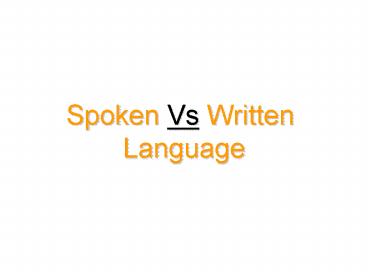Spoken Vs Written Language PowerPoint PPT Presentation
1 / 20
Title: Spoken Vs Written Language
1
Spoken Vs Written Language
2
Introduction
Languages are first spoken, then written, and
then an understanding
3
Aspects of written and spoken language
Written
Spoken
unplanned
planned
organized
less structured
interactive
transactional
4
Characteristics of Spoken Language
- Repeating
- first draft status
- vocabulary
- grammar
- intonation
- Variation in speed
- Loudness or quietness
- Gestures - body language
- Intonation
- Stress
- Rhythm
- Pausing and phrasing
5
Characteristics of Written Language
- final draft status
- density of content
- grammar
- neutrality of social roles
- punctuation
6
Unique Written Vocabulary
7
Which comes first speech or writing?
- Speech comes before writing historically.
- Many languages lack a written form.
- Many individuals cannot use written language.
- Children automatically learn to speak,
- but have to be taught how to read.
8
- Is written language superior to speech ?!
- English language has two main features
9
- Similarities Between Spoken and Written Language.
10
THE Differences between written spoken
11
(No Transcript)
12
1-Formality
- Examples
- A written note might say,
- "Would you like to go out to lunch?
- The person who would write that note, might
alternatively say, in person, - "You wanna go out for lunch? "
13
2-Grammatically
- more verb based phrases(e.g. having treatment
(W), being treated (S), hospital care (W), go to
hospital (S)) - more predicative adjectives(misleading
statistics (W), statistics are misleading (S)) - fewer complex words and phrases
14
3-Vocabulary Sentences
- Oral communication uses words with fewer
syllables than the written language. - Written English consists of neat, correct
sentences. - Speech usually consists of idea units.
15
Examples
- because
- kuz
- "I don't wanna go to the party, kuz it sounds
boring." - bet you
- betcha
- "I betcha can't eat ten hot dogs!"
- could have consonant
- kuda
- got you
- gotcha
- "I gotcha that candy bar you asked for."
- has to
- hasta
- "He hasta know how much he means to me."
- have to
- hafta
- "I hafta clean the house before I go out."
16
4- Pronunciation
- Written
- I want to go to the store
- Spoken
- I wanna go duh the store
- If you doubt that "to" becomes "duh,"
17
Sounds patterns in spoken
- We write slowly than we speak
- Once the utterance is spelled there's no way 2
take it back and it dies in the wind . Unlike the
written form, its documented and can be shifted - In Spoken
- You must know the sound system of the language
- You must also know how the sounds change in fast
speech. - The English sound system varies .
- In WRITTEN
- we replace the pauses, intonation and the
hesitation that shown in speeches with
Punctuation (.,-) in writing. - Accent ? spelling
- Dialect? vocabulary
18
Finally .. Redundancy
- Repetition is built in to language it self
- Necessary for effective
- COMMUNICATION
19
Spoken Language Problems and solutions
- Spoken problems begin in the childhood.
- Kinds of spoken language problems.
- Problems effect.
- Solution.
20
Conclusion
- We treat written and spoken language as of
- EQUAL IMPORTANCE
- Both of them are part of the language

